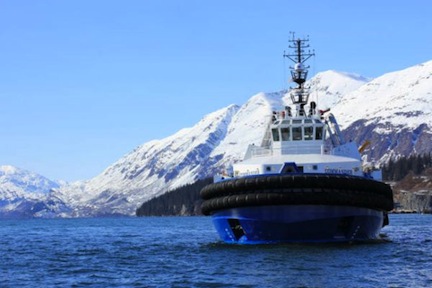(VALDEZ, Alaska) — The first of nine new tugboats from Edison Chouest Offshore has arrived in Port Valdez for the Alyeska Pipeline Service Co., marking the shift in oil spill prevention and response from Crowley Marine Services, Alaska Public Media reported.
On Monday, Alyeska staff and the boat’s crew showed off Commander, the new vessel from Louisiana-based Chouest. In addition to the nine newbuilds that will help guide oil tankers, there are four new response barges outfitted and crewed to respond to an oil spill.
The tugboats, barges and crews arriving in the port are the most visible sign of the transition taking place in Prince William Sound. The switch from Crowley has drawn scrutiny in the region, so Alyeska is working to reassure Alaskans that Prince William Sound — the site of the 1989 Exxon Valdez oil spill — will be safer than ever.
“It’s an improvement — we’re roundly convinced that it’s an improvement,” said Alyeska's Mike Day.
Crowley has had a long, successful history in Prince William Sound, so when Alyeska said in 2016 it was ending its response contract with the company, it drew a lot of skepticism. Day said that’s understandable.
“We knew that this would receive a lot of scrutiny. And we welcome that,” he said. “So no, there was no illusion that this was going to be a matter of swapping out some tugboats and some people and continuing business.”
Some of the loudest criticism has come from unions; Crowley’s workers are union members and Chouest’s are not.
“It’s quite frankly a disgrace. That’s how we feel about it,” said Don Marcus, president of the International Organization of Masters, Mates & Pilots (MM&P).
Marcus called Chouest “exceedingly anti-union.” It’s not clear if the company will hire Crowley workers once its contract ends, although Chouest won’t rule out the possibility.
“Edison Chouest said that they intend to hire Alaskans over time but that for mariners, they will likely draw from their existing work force of experienced captains and crew,” Alyeska spokeswoman Michelle Egan said, adding, “every applicant will be considered as positions become available.”
Marcus argued that by bringing in crews new to Alaska waters, Chouest is putting Prince William Sound at risk. Alyeska disagrees. It says Chouest’s captains have an average of 26 years of experience and that they’re undergoing extensive training to prepare for the sound’s conditions.
Training is also an issue for another group, the Prince William Sound Regional Citizens Advisory Council. In January, the group unanimously passed a resolution stating that Alyeska should require Chouest’s crews to train in all weather conditions in which they’re expected to operate. Alyeska rejected the request; its position is that training in rough weather would put crews in danger unnecessarily.
Click here to read the story.

